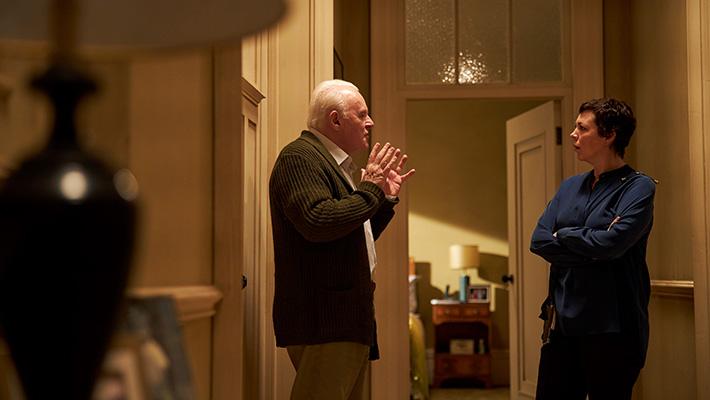Science on Screen®: Visualizing Alzheimer’s in the Lab and in "The Father"

Anthony is 80, mischievous, living defiantly alone and rejecting the carers that his daughter Anne encouragingly introduces. Yet help is also becoming a necessity for Anne; she can’t make daily visits anymore and Anthony's grip on reality is unravelling due to the progression of a neurodegenerative disease that impacts his memory, behavior, and sense of identity.
Florian Zeller’s debut feature film is a heart-breaking and uncompromisingly poignant portrait of love and loss. Featuring dynamic cinematography that maps Anthony’s unsettling cognitive decline and riveting performances by Anthony Hopkins and Olivia Coleman, The Father makes visible and visceral the experience of losing oneself and a loved one to an insidious disease like Alzheimer’s.
In this special Science on Screen® event, Professors Nozomi Nishimura and Chris B. Schaffer will explain the work their research lab is doing to better understand how various physiological systems may contribute to disease initiation and progression, in the hopes of finding new ways to treat neurodegenerative disease, cardiovascular disease, and cancer.
In addition to discussing how Alzheimer’s disease affects the brain, they will offer a behind-the-scenes look at the scientific process, discussing the microscopic optical technologies their lab has developed and the tools they use to examine how blood flow, the immune and inflammatory systems, and native tissue cells interact in various disease states in animal models.
This screening will be presented as part of the 2025 National Evening of Science on Screen®!
Science on Screen® is an initiative of the Coolidge Corner Theatre, with major support from the Alfred P. Sloan Foundation. The program supports creative pairings of current, classic, cult, and documentary films with lively introductions by notable figures from the world of science, technology, and medicine.
About the speakers
Nozomi Nishimura grew up in Tucson, Arizona. She majored in Physics at Harvard College where she worked with Prof. Eric Mazur on femtosecond laser ablation. In graduate school she became interested in neuroscience and worked with Prof. David Kleinfeld at University of California at San Diego. Although still in the Physics Department, her research focused on studying blood flow in the brain of rodents and developing laser-based models of small stroke. She came to Biomedical Engineering at Cornell in 2006 to do a postdoc with Prof. Chris Schaffer. She became an Assistant Professor in Biomedical Engineering in 2013. At Cornell, current research expands the use of in vivo imaging techniques to study a variety of disorders including Alzheimer's disease, cardiac disease and cancer metastasis. As a postdoc, she was awarded a L'Oreal USA Fellowship for Women in Science, the NIH Ruth L. Kirschstein NRSA Postdoctoral Fellowship, and the American Heart Association Postdoctoral Fellowship and while at UC San Diego, she received a National Science Foundation Graduate Research Fellowship.
Prof. Nishimura is interested in how the vasculature, immune, inflammatory systems and cells native to a tissue interact in disease states. Her lab's strategy is to develop novel tools to image the contribution of multiple physiological systems to diseases with in vivo animal models. To study these systems at their full complexity in the complete living animal, they use multiphoton microscopy to image cell dynamics in rodents. They also use femtosecond laser ablation and quantitative analysis to dissect function in the living system. In diseases as diverse as cardiovascular disease and cancer metastasis, the microvasculature provides an avenue of access for immune and inflammatory cells. Alterations in blood flow and the invasion of blood-borne cells are examples of complex events which can shape how a disease either progresses or resolves. The lab compares these dynamics across multiple organ systems and diseases.
Chris B. Schaffer is an Associate Professor and Director of Graduate Studies in the Biomedical Engineering department at Cornell University. Chris grew up in Jacksonville, FL and was an undergraduate at the University of Florida, where he studied physics. He received his PhD from Harvard University, also in physics, where he worked with Eric Mazur. He was then a post-doc in David Kleinfeld's neuroscience laboratory at the University of California, San Diego. He now runs a lab at Cornell that develops advanced optical techniques that enable quantitative imaging and targeted manipulation of individual cells in the central nervous system of rodents with the goal of constructing a microscopic-scale understanding of normal and disease-state physiological processes in the brain. One area of current focus is understanding the role of brain blood flow disruptions in the development of Alzheimer's disease.
Chris is also active in developing novel educational strategies to teach science as a dynamic process for discovery. These approaches are used in outreach settings in middle and high-school science classes as well as in his undergraduate and graduate level courses. Chris also has a strong interest in science policy and recently spent a one-year sabbatical in Washington, DC, working as a science policy fellow for Senator Edward Markey in the United States Congress. He continues to be active in science policy, including through a course he teaches on this topic in the Fall. Chris is an accomplished surfer, having ridden waves all over the world and surfed some "big wave" spots, including greater than 20 ft. waves at Todos Santos, Mexico.
